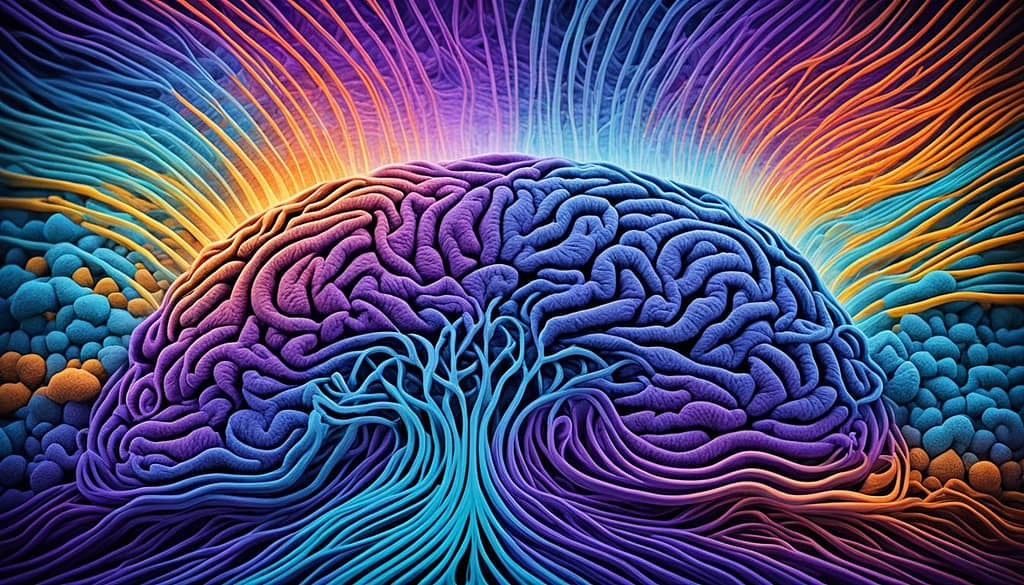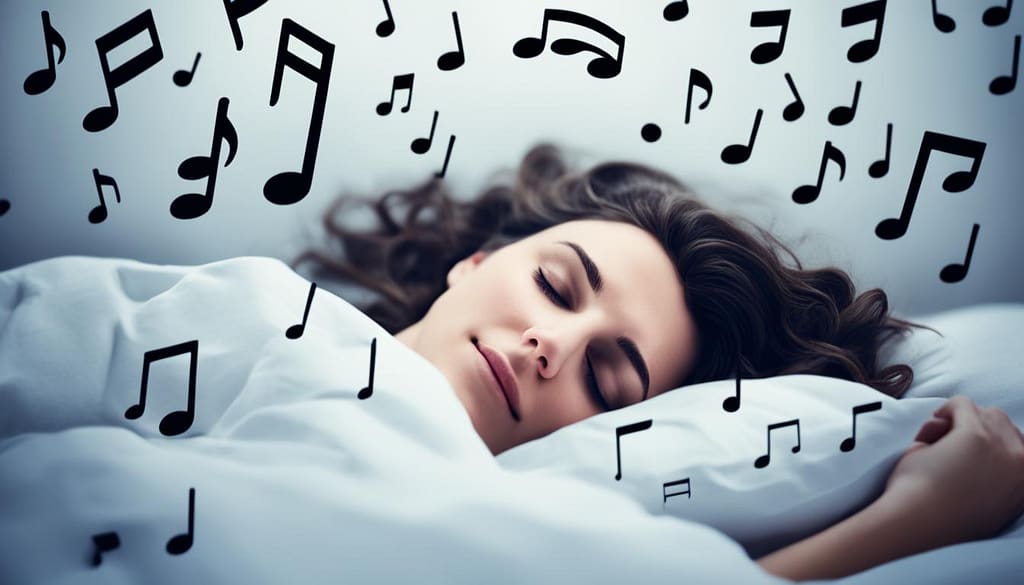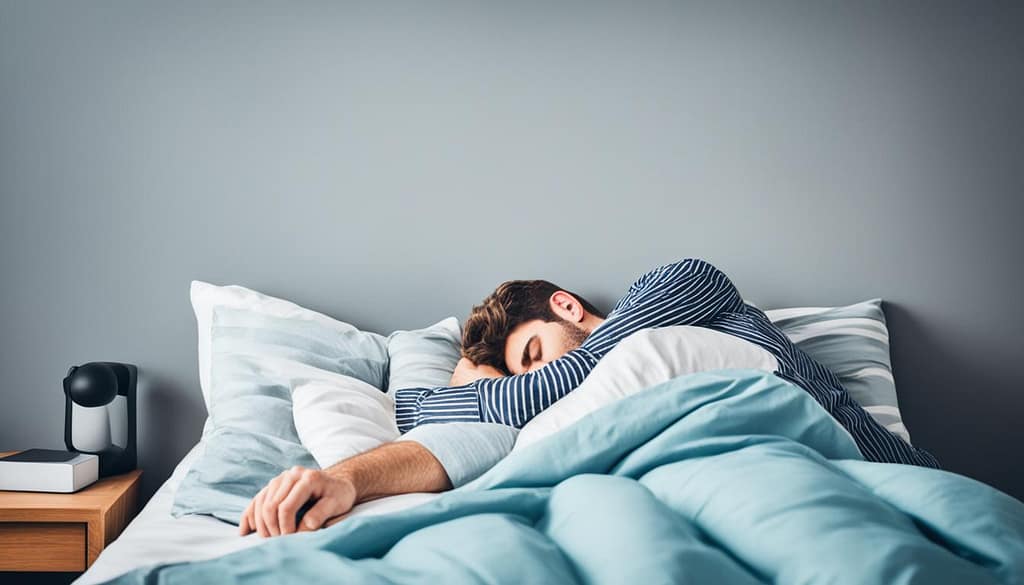As you settle into your bed, your favorite tunes fill the air, making you feel sleepy. But, is this music really helping you sleep better, or is it hurting your rest? Music and sleep have a complex relationship, with both good and bad sides.
Listening to music to fall asleep can feel comforting. Music is known for helping with relaxation, stress, and pain. But, the effect of music on sleep is not simple.
Key Takeaways
- Music can make sleep better by helping you fall asleep faster, making sleep more efficient, and improving overall sleep quality.
- Music lowers stress hormones, boosts happy feelings, and calms the nervous system.
- But, music for sleep has limits, like the type of music, volume, and issues like earworms or ear wax from headphones.
- Whether to sleep with or without music depends on what works best for you and your sleep.
- Adding music to your sleep can be helpful, but make sure it fits your needs and preferences for better sleep.
We’ll look into how music and sleep are connected. We’ll talk about the good and bad sides of using music for sleep. This will help you decide if music is right for you at night.
The Impact of Music on Sleep Quality
Many studies show how music affects sleep quality. Listening to calming music before bed helps you fall asleep faster and sleep better. Music changes our body and mind in ways that make us relax and sleep better.
Potential Benefits of Listening to Music Before Bed
Listening to music before bed can lower stress hormone levels. High stress can keep you awake, but music helps reduce this. It also makes you feel good by releasing dopamine, a happy hormone.
Music slows down your breathing, lowers your heart rate, and reduces blood pressure. These changes help you relax and sleep better. This is great for people with sleep disorders or sleep hygiene problems. Music can make their sleep more peaceful.
| Potential Benefits of Listening to Music Before Bed | Impact on Sleep |
|---|---|
| Reduces cortisol levels | Decreases time to fall asleep |
| Triggers dopamine release | Improves overall sleep quality |
| Soothes the autonomic nervous system | Promotes relaxation and better sleep |
Using music as a way to relax can lead to better sleep. It makes sleep more refreshing and helps you wake up feeling better. This shows how music can improve music effects on sleep.
“Music has the power to calm the mind and body, creating an environment that is conducive to better sleep. Incorporating it into your nightly routine can be a game-changer for your sleep quality.”
How Music Affects the Body and Mind
Music deeply impacts our health, touching both our body and brain. It helps control breathing and heart rate and boosts mood with neurotransmitters. Music’s effects are clear and powerful.
Our body’s rhythms match the music’s beat, making our breathing and heart rate sync. This brings calm and relaxation. Music also triggers the release of serotonin and dopamine, making us feel better.
The Role of Music in Masking Disruptive Noises
Music can make sleep better by covering up disturbing sounds like traffic or loud neighbors. These sounds can ruin sleep, but music can help.
Music adds a soothing sound layer, hiding the unwanted noises. This lets the brain focus on the music, not the noise. This means better sleep without interruptions.
Music works both sides of the brain, boosting problem-solving and thinking skills. This is great for those who have trouble sleeping or don’t sleep well. It keeps the brain active and alert while sleeping.
The link between music, our body, and mind is deep and complex. Music is key in controlling our body’s functions and improving our well-being. This includes better sleep quality.
Choosing the Right Music for Sleep
Finding the perfect music for sleep means picking songs with a slow beat, around 60-80 beats per minute. This matches your body’s natural resting heart rate. It helps your body relax and makes it easier to fall asleep.
Many studies look at relaxing classical or ambient music for sleep. But what’s most important is finding music you enjoy and find soothing. Try different genres, like video game soundtracks or pop ballads, to see what works best for you.
Using music genres for sleeping and relaxation techniques can greatly improve your sleep. The right music can help calm your body and mind. This makes it easier to fall asleep and sleep better.
| Music Genre | Potential Benefits for Sleep |
|---|---|
| Classical | Slower tempos and lack of lyrics can promote relaxation and reduce mental stimulation. |
| Ambient/Instrumental | Soothing, repetitive melodies can help mask disruptive noises and create a peaceful environment. |
| Nature Sounds | The calming effects of nature sounds, such as rain or ocean waves, can induce a sense of tranquility. |
| Binaural Beats | These specialized audio tracks are designed to induce brainwave patterns associated with relaxation and sleep. |
What’s most important is finding music you enjoy and find soothing. Try different genres and styles to find the music genres for sleeping that work best for you and your relaxation techniques.
“The right music can be a powerful tool for promoting sleep and relaxation. By choosing the right tunes, you can create a sleep-friendly environment that helps your body and mind unwind, leading to a more restful and rejuvenating night’s sleep.”
Is it Better to Sleep With or Without Music?
Many people wonder if it’s better to sleep with or without music. Research shows that music can help you fall asleep faster and sleep better. But, it really depends on what you like and need for sleep.
Music can calm you down and make you less stressed before bed. Some music, like classical or ambient, can also block out noise. Studies show that music can make you sleep more efficiently and fall asleep quicker.
But, music isn’t good for everyone’s sleep. Some people might find it keeps them awake, stuck on a song, or uncomfortable. Headphones can also cause earwax buildup or discomfort.
“The decision to sleep with or without music should be based on personal experience and experimentation to determine what works best for the individual’s sleep habits and environment.”
So, whether to sleep with or without music is up to you. Try different things to see what helps you sleep best. The main goal is to make your sleep area help you wake up feeling refreshed.
Factors to Consider
- Your personal preference for sleeping with or without background noise
- The type of music you listen to and its effect on your sleep
- The volume and quality of the music to avoid disruptive sounds
- The potential for headphones or devices to cause discomfort or issues
- Your sleep environment and any existing noises that music may help mask
Think about these points and try different methods. This way, you can figure out if music or silence is better for your sleep.
Incorporating Music into Your Sleep Routine
Adding music to your bedtime routine can greatly improve your sleep hygiene. It helps signal to your body that it’s time to relax. This can lead to better sleep quality.
Tips for Making Music Part of Your Sleep Hygiene
Here are some tips for adding music to your sleep environment:
- Pick calming music that you like, not music that makes you feel emotional.
- Use speakers instead of headphones to avoid ear problems.
- Try different music styles to see what works best for you.
- Make listening to music a regular part of your bedtime routine.
By making music a key part of your bedtime, you can use its calming effects to help you sleep better. This supports good sleep habits.
| Benefit | Description |
|---|---|
| Relaxation | Calming music can lower stress and anxiety, making it easier to relax. |
| Improved Sleep Onset | Music before bed can help you fall asleep faster. |
| Enhanced Sleep Quality | Music can make sleep more efficient and increase deep sleep time. |
Adding music to your bedtime routine is a simple way to boost your sleep hygiene. It leads to a more refreshing sleep.
The Science Behind Music and Sleep
Music and sleep have a deep connection. Music can make the brain release neurotransmitters like serotonin and dopamine. These chemicals help improve mood and make us feel relaxed, which is key for good sleep.
Music’s tempo is important too. Studies say music with a beat of 60-80 beats per minute can make our body’s rhythms match the music. This can make us feel more relaxed. It also helps block out noise, making sleep better.
The way our brain works while we sleep is also linked to music. Brain activity during sleep affects how well we sleep and how refreshed we feel. Some music can even change our brain waves, making sleep more refreshing.
| Physiological Effect | Impact on Sleep |
|---|---|
| Slower heart rate | Promotes relaxation and drowsiness |
| Decreased cortisol levels | Reduces stress and anxiety, aiding sleep onset |
| Synchronized brain wave patterns | Enhances sleep quality and duration |
Studying how music effects on sleep is really interesting. Researchers are looking into how music and sleep are connected. By learning more, we can use music to sleep better and feel better overall.

“Music has a profound effect on our physiology, triggering the release of neurotransmitters that can induce a state of calm and relaxation – the perfect precursor to a good night’s sleep.”
Personalized Approaches to Music Therapy
For many, adding music to their bedtime routine helps a lot. But some might find that personalized music therapy works even better. Certified music therapists can look at your sleep needs and make a plan just for you.
Music therapy is more than just listening to calming music before sleep. It can mean making music yourself, like playing an instrument or singing. This way of engaging with music can really help people with sleep problems or mental health issues.
Music therapists can tailor the music and therapy to what you need. They can help with anxiety, make you more relaxed, or block out noise. This personalized approach can be a key to better sleep for you.
“Music therapy has been shown to be particularly effective for individuals with sleep disorders or other underlying mental health conditions that contribute to sleep disturbances.”
If you’re having trouble sleeping or your current routine isn’t working, think about personalized music therapy. With a certified professional’s help, you can use music to greatly improve your sleep and overall health.
Unlocking the Power of Personalized Music Therapy
Certified music therapists can help you in many ways:
- They assess your sleep needs and make a plan just for you.
- They add music-making activities, like playing an instrument or singing, to your routine.
- They focus on the things that might be keeping you awake, like anxiety or noise.
- They offer ongoing support and adjust your music therapy as needed.
Working with a certified music therapist can unlock music’s full power to enhance your sleep and well-being. Try personalized music therapy and take charge of your sleep today.
Limitations and Considerations
Music can help improve sleep, but there are important things to remember. One big thing is the noise levels for sleeping. If the music is too loud, it can actually make it harder to sleep. Using headphones or earbuds can also cause earwax buildup or discomfort.
The sleep environment is key to how well music helps you sleep. Different music affects people differently. You might need to try out various genres and volumes to find what works for you.
Music shouldn’t replace other sleep solutions, like treating sleep disorders or fixing environmental issues. While music can help, it’s not a cure-all for ongoing sleep problems.
In short, music can be a great sleep aid, but we must be aware of its limitations for sleep. Think about noise levels, your sleep space, and what you like to listen to. This way, music can make your sleep better, not worse.
“The type of music and personal preferences also play a significant role, as what one person finds relaxing may be stimulating for another.”
Conclusion
Whether to sleep with or without music is a complex topic. Many factors come into play. Research shows music can help you fall asleep faster and sleep better. But, it’s all about what you prefer and need for sleep.
Try out different music genres and volumes to see what suits you. Adding music to your bedtime routine can help. If you have ongoing sleep problems, a music therapist could offer tailored advice.
It’s important to find what helps you sleep well, with or without music. Focus on improving your sleep quality. Using music or other strategies can lead to better sleep and overall health.
FAQ
Is it better to sleep with or without music?
Whether to sleep with or without music depends on what you prefer and your sleep needs. Some studies show music can help you fall asleep faster and sleep better. But, others might find music keeps them awake or gets stuck in their head. It’s best to try it out and see what works for you.
How can music impact sleep quality?
Music can make sleep better in many ways. It can help you fall asleep faster and improve the quality of your sleep. It lowers stress hormones and releases happy hormones, which can make you feel good and help with pain.
Music also calms your nervous system. This means your breathing slows down, your heart rate goes down, and your blood pressure lowers. All these changes help you relax and sleep better.
How does music affect the body and mind?
Music has a big impact on both the body and mind. It can make your body move to the beat and release happy chemicals in your brain. This can make you feel happier and more relaxed.
Music also helps both sides of your brain work better together. It can bring back memories and make you feel nostalgic, which can also help you relax.
How can music help mask disruptive environmental noises?
Music can cover up sounds that might keep you awake, like traffic or neighbors. It creates a background sound that helps block out these noises. This can make it easier to sleep without being disturbed.
What type of music is best for sleep?
Songs with a slow beat, around 60-80 beats per minute, work best for sleep. This tempo matches your body’s natural rhythm, helping you relax. You can use any music you like, as long as it makes you feel calm.
What are the limitations and considerations when using music for sleep?
Music can be great for sleep, but it’s not always the best solution. Loud music can keep you awake. Using headphones can cause earwax buildup or be uncomfortable.
What music you like matters a lot. It should make you feel calm, not awake. Music shouldn’t replace other sleep treatments if you have sleep problems.
How can I incorporate music into my sleep routine?
Adding music to your bedtime routine can help you sleep better. Listening to calming music every night can signal your body that it’s time to sleep. Choose songs you enjoy and find relaxing.
Using speakers instead of headphones can prevent ear problems. Try different types of music to find what helps you sleep best.
How does the science behind music and sleep work?
Music affects the brain and body in ways that help you sleep. It releases happy chemicals and changes your heart rate and breathing. This can make you feel calm and ready for sleep.
Music with a slow beat, 60-80 beats per minute, can make your body and mind relax. This can help you fall asleep faster and sleep better.
How can music therapy help with sleep issues?
Music therapy can be very helpful for sleep problems. Certified music therapists create plans just for you. They might have you listen to music or make music yourself, like playing an instrument or singing.
This approach is great for people with sleep disorders or mental health issues that affect sleep. A music therapist can tailor the music and therapy to your needs, helping you sleep better.
Source Links
- Music and Sleep – https://www.sleepfoundation.org/noise-and-sleep/music
- Is listening to music better than a sleeping pill? – https://health.ucdavis.edu/news/headlines/is-listening-to-music-better-than-a-sleeping-pill/2023/07
- Effects Of Listening To Music While Sleeping – The Pros and Cons – Sleep Advisor – https://www.sleepadvisor.org/listening-to-music-while-sleeping/

